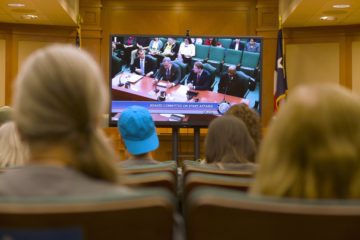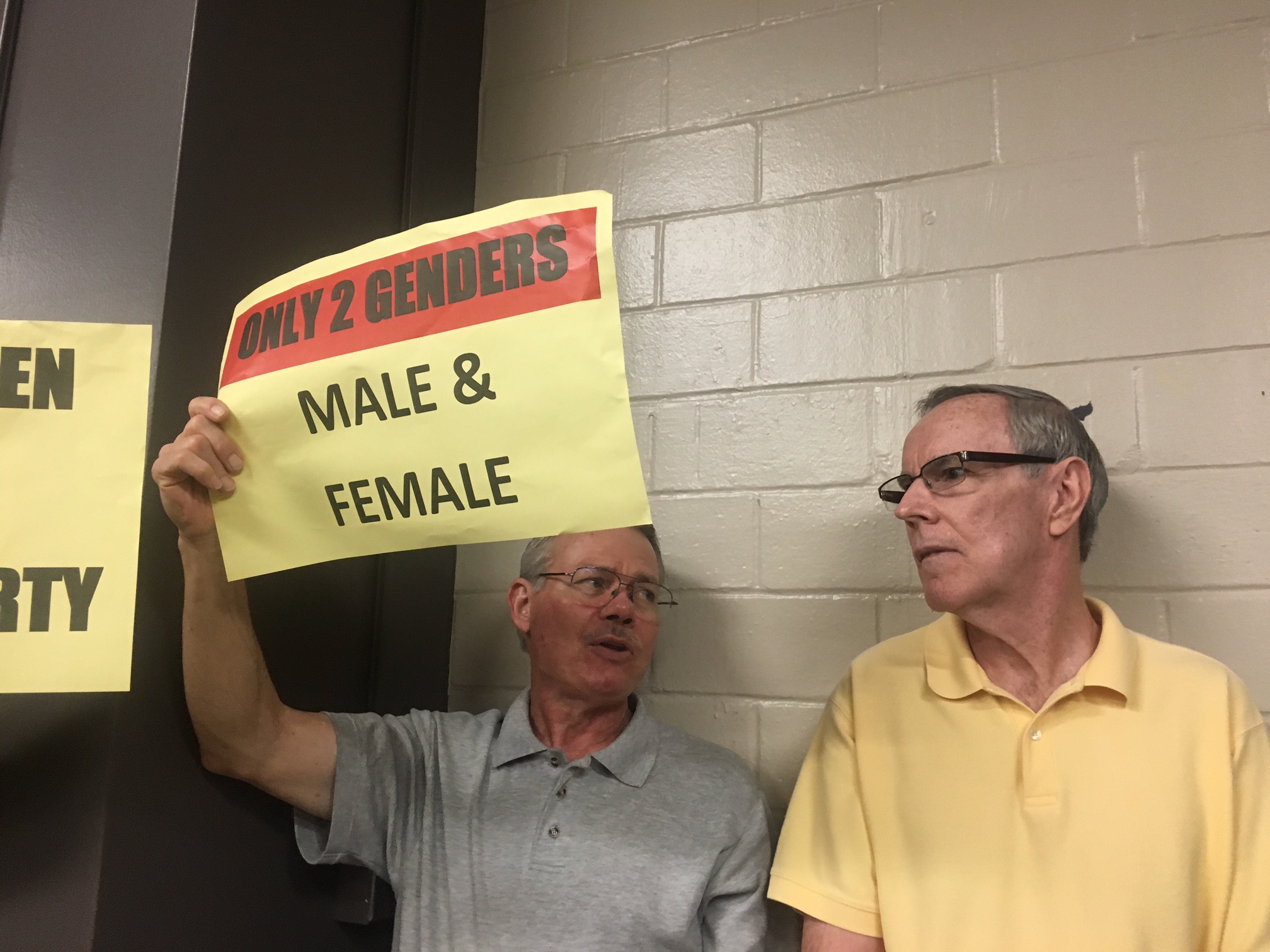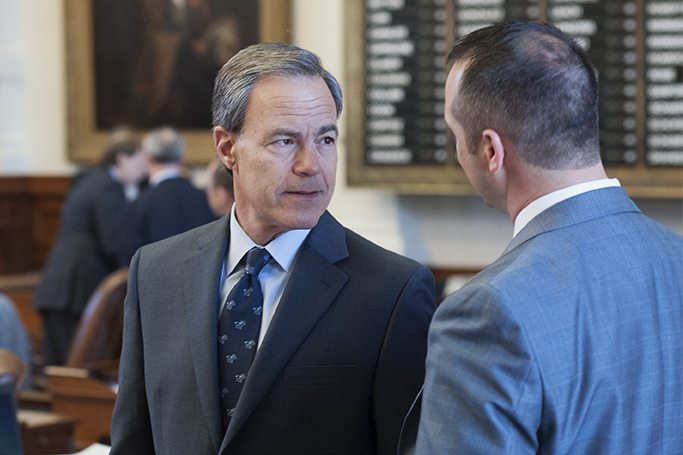
In Ritual Beating-Up of Vulnerable Texans, Senate Advances ‘Bathroom Bill’
Hundreds of Texans again asked for their essential dignity to be respected and maintained because of arcane political maneuvering.


There’s a peculiar ritual that has taken shape in the Texas Legislature. It happened again on Tuesday, when the Senate Committee on State Affairs heard public testimony on Senate Bill 6, known colloquially as the “bathroom bill,” at a hearing that lasted nearly 21 hours from start to finish. Just before 5 a.m. Wednesday, the committee kicked the bill to the full Senate with a 7 to 1 vote.
The reason for the ritual is this: The conservative faction of the Republican Party needs to be seen fighting for something, but it’s hard to find stuff to battle over when you’ve owned state government for 20 years. You can’t fight Democrats because they don’t have any power, and now you can’t even fight against the Obama administration. Inevitably, then, a couple bills come down every session that tie into the latest hot-button social issues, and allow you to land some punches while avoiding talking about stuff like school finance, which is difficult and complicated.
These bills typically target the dignity, autonomy or privacy of some vulnerable group — women, immigrants, LGBT folks. This year, it’s the bathroom bill. Senate Bill 6 would bar transgender people from using the bathroom that matches their gender, instead requiring that they use the bathroom associated with the “biological sex,” as assigned on their birth certificate.
The bill’s ostensible purpose is to protect women from sexual predators. The bill’s real purpose is that it allows people like Lieutenant Governor Dan Patrick to hoot and holler. Conservatives want to maintain that delicious and politically potent feeling of insurgency against a rotten culture, even when they hold all the power. Patrick himself has repeatedly betrayed a deep psychological need to exhibit righteousness against persecution, as he did when he compared the battle over SB 6 to the Battle of the Alamo. (Wait, didn’t the guys at the Alamo lose?)
But that’s not the ritual. The ritual comes when these bills get public hearings, as the bathroom bill did on Tuesday. Hundreds of people take time away from their families and responsibilities to come to the Capitol, often driving across the state to do so, to explain why the Legislature is hurting them. They come at an ungodly early hour and wait in florescent-lit and over-air-conditioned rooms to speak at committee hearings that can last 16 hours or more.
More than 420 people signed up to testify on the bathroom bill. The hearing started at 8 a.m., and it wasn’t until after 2:30 p.m. that public testimony began. The last person to testify did so a little before 5 a.m. Some 450 people showed up at a Senate hearing on a sanctuary cities bill in February. In 2015, huge numbers showed up at marathon hearings for that year’s version of the sanctuary cities bill as well as an effort to repeal the Texas DREAM Act, which helps undocumented high school students attend state colleges. Other marathon hearings have concerned anti-abortion and pro-gun legislation.

The nature of these bills means it’s often emotionally draining for opponents to testify, so it’s all the more impressive that so many people do so. Every abortion bill means agonizing and difficult testimony from women who feel obliged to share their life stories. Every gun bill brings out victims of mass shootings. Every bill on immigration compels hundreds of tearful and stressed people — many of them undocumented — to come to the Capitol, to wait for 12 hours or more, only to ask stone-faced senators not to make it more likely that their parents would get deported, or to keep a sibling or child from going to college.
Some of these bills do pass. But many of them are effectively dead on arrival. Patrick introduced the bill repealing the Texas DREAM Act to fulfill a campaign promise, but it never even got to the floor of the Senate. Republicans killed it. It was for show. But the testimony of undocumented teenagers, who weren’t sure if they’d be able to go to college, was real. So was the great time and expense of the parents and young people who came down to testify on their behalf.
It’s hypothetically possible that SB 6 could pass, particularly if Governor Greg Abbott calls a special session for some other issue and pushes bathroom stuff as a priority. But at the moment, it seems dead as a doornail. House Speaker Joe Straus, in his quiet way, has indicated he thinks the bill is stupid. Abbott isn’t pushing it. The powerful business lobby hates it.

So, because of some arcane political maneuvering, hundreds of people — including worried parents of transgender kids, and transgender adults and kids, threatened by supreme humiliation at the hands of their Legislature — came down to ask for their essential dignity to be respected and maintained.
It has the distinct feel of sadism. One of the key factors in the suicide rate of transgender teens, psychologist and trans man Colt Keo-Meier told the panel, is the feedback they’re getting from society at large. Transgender kids are at a high risk for suicide, he told the panel, and the worst thing to do is tell them they’re confused, or perverted, or can be “fixed.” From this perspective, an extended period in which the government of the state of Texas is telling transgender people their concerns are fake and they are identified with child molesters and sexual predators does not seem ideal.
But more than that, Keo-Meier’s simple physical presence in the room demonstrated the weirdness of Patrick’s bill. He has a deep voice and facial hair, and doesn’t give the impression of having been born a woman. He testified that he’d never had a problem using the men’s bathroom. Yet the bill would ordain that he only use the women’s bathroom, where his presence would presumably be threatening. The slogan of social conservatives on this issue is “no men in women’s bathrooms.” But SB 6 would push countless men into women’s bathrooms.
Thank you to Dr. Colt Keo-Meier testifying in opposition to #SB6 and standing up against discrimination in Texas. #StopSB6 #TXlege pic.twitter.com/r636dDJ5CM
— ACLU of Texas (@ACLUTx) March 7, 2017
No one seems to have thought this through, and the Republicans on the committee didn’t really seem eager to engage in a debate over it. Even the bill’s author, Lois Kolkhorst, seemed uncomfortable. “I want you to know the sensitivity with which this was crafted,” she told Keo-Meier. “It was crafted out of the thought of privacy and other issues. We’re all learning. And listening.” Then she asked a completely off-topic question about which teams trans kids play sports for.
Two Democrats showed no such reluctance to participate. Senator Sylvia Garcia of Houston, who isn’t even on the committee, stayed for the entire thing, listening to more of the testimony than nearly anyone who actually was. Senator Eddie Lucio Jr. of Brownsville, who recently announced he’d cross party lines to support the bill, took a different tack. Lucio’s a strong advocate for his district and poor Texans, but has long been conservative on social issues. He’s pro-life and not a fan of gay rights.
On Wednesday, he sometimes seemed antipathetic to the mere existence of transgender people. But it also seemed, at points, as if he was wrestling with the righteousness of his new public position, which has put him at odds with not only the rest of his party but his own son, a state representative who opposes the bill.
Seemingly mystified by the idea that Keo-Meier was a Christian, Lucio challenged him: How does he square his belief in the Bible with his zeal for “altering God’s creation?” When he asserted that it was “a civil rights issue,” Lucio got angry. And when an El Paso official testified that the county commissioners opposed the bill, Lucio circled back to him to ask: What would he do if his daughter came to him, and said she’d been touched by a man in her bathroom? The fellow, understandably, couldn’t answer. Then Lucio left the room.


